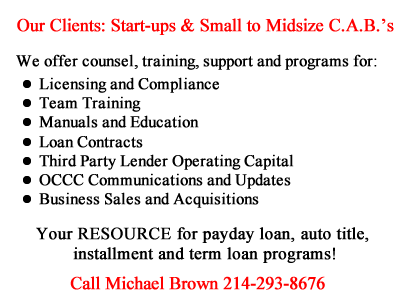The “Lend 360” Conference is coming up in Dallas on the 25th here are the summary details.
The “Lend 360” Conference is coming up in Dallas, September 25-27. Since it is in our back yard versus Florida or California wanted to discuss it a bit and give you some information for you to better decide on whether you will or will not attend.
Many of our vendor and TOFSC sponsor companies will be there so that is a great reason to go out of the gate. (Microbilt, Clarity, Leads Market, Factor Trust Trans Union, Dot 818, Payliance, Repay, Zero Parallel, Infinity, and Loan Payment Pro) along with many others.
Looking at the schedule over the 3-day period…it starts at 1p on Wednesday, goes until 5p. Thursday is 8a-5p, and Friday is 8a-1130a. The format appears to be traditional conference presentation style, in 8-10 different rooms of the Fairmont Hotel in downtown Dallas along with a larger vendor / sponsor booth gathering area.
Summary of presentation topics:
- Federal law – conversation around lending.
- Small business customer acquisition (could be very relevant to our group).
- All parts and pieces of the “FinTech” industry – this is the major component of the conference.
- 2020 election impact on FinTech.
- Investor outlook on Fintech.
- Conversation on moving into “alternative credit market” and products / services in the “non-prime market.
- How FinTechs work with banks, there is more than one of these, so it appears to be a big part of FinTech operations…interesting.
- How to use multiple domain names for your business online to drive traffic to your business (could be very relevant to our group).
- Staying ahead of fraudsters (could be very relevant to our group).
- Data security.
- FinTech investors and other capital providers will be in attendance and will speak.
- Advertising and marketing round table (could be very relevant to our group).
- Making your business recession proof.
- Optimizing debt selling and collections strategies.
Costs $2,600 to attend and here is a link to more information: https://www.lend360.org/schedule/
This blog post was written by Michael Brown, President of CAB Consulting and the Texas Organization of Financial Service Centers. He can be reached at 214-293-8676, or Michael@CreditAccessBusiness.com.
Previous post: Silicon Valley FinTech “Earnin” may need to buckle up for a bumpy ride.
Next post: What is a FinTech really? Be one.

